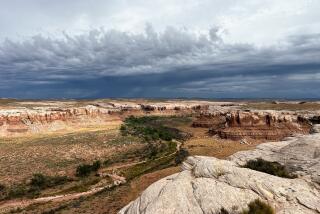Clinton and the Environment: A Good Record May Improve : Newly signed parks bill could be a symbol for new term
- Share via
The first bill that President Clinton signed after his reelection was the Omnibus Parks and Public Lands Management Act of 1996. In an Oval Office signing ceremony last week, he praised the legislation as the sort of cooperative effort he hopes will characterize the next Congress.
The parks bill expands and makes boundary adjustments in scores of parks, authorizes dozens of land swaps and establishes new historic trails and scenic rivers in 41 states. For example, the law creates a nonprofit trust to fund and manage the Presidio, a 1,400-acre former Army base in San Francisco. It also will help New York and New Jersey purchase 17,500 acres of the Sterling Forest, which many had feared might fall to developers, and establishes a national historic trail commemorating the 1965 voting rights march at Selma, Ala.
The path to final passage of this bill was anything but smooth; what began as a modest 20-page measure ballooned to more than 400 pages, layered with pork, federal giveaways and dubious regulatory changes. Nonetheless, Clinton’s hope for consensus and more cooperation on pressing public lands issues is worth underscoring.
The president’s moderate, conservationist views on these questions sharply contrasted with those of many members of the 104th Congress. But in the past two years, Clinton often had to play a rear-guard action on the environment. He blocked oil drilling in Alaska’s Arctic Wildlife Refuge, vetoed legislation that would have led to giveaways of federal mineral and grazing rights and opposed efforts to undercut long-standing regulatory programs that safeguard important natural resources. Clinton’s middle-ground solutions often left congressional Republicans looking extremist by contrast.
While many activists were disappointed by Clinton’s first-term record--particularly his agreement to permit salvage logging in some old-growth federal forests--he won public support for his conservationist actions.
Now he has the opportunity to do more. During his first term, Clinton proposed changes to the controversial Endangered Species Act and other resource management programs. His proposals promise focus on comprehensive planning, involving all public and private constituents, to prevent disputes over the use of resources or threats to rare animals or plants. That approach, implemented with some success in San Diego and Orange counties, makes even more sense now, and it is in the interest of both Congress and the new administration to pursue it.
The Clinton administration tried but failed to win reform of the below-market rates paid by private parties for grazing, mining and logging on federal lands. The prevailing fee and royalties have long been so low, especially for mining, that they are in essence a taxpayer subsidy for extractive industries.
The national park system should also be high among Clinton’s priorities. These exquisite places are increasingly crowded and underfunded. Congressional appropriations are proving inadequate, and new sources of revenue must be found, but only those consistent with preserving the pristine, natural quality of the parks.
If Bill Clinton wants to leave his mark as president, these natural resource priorities, unresolved during his first term, are a good place to start.
More to Read
Sign up for Essential California
The most important California stories and recommendations in your inbox every morning.
You may occasionally receive promotional content from the Los Angeles Times.










